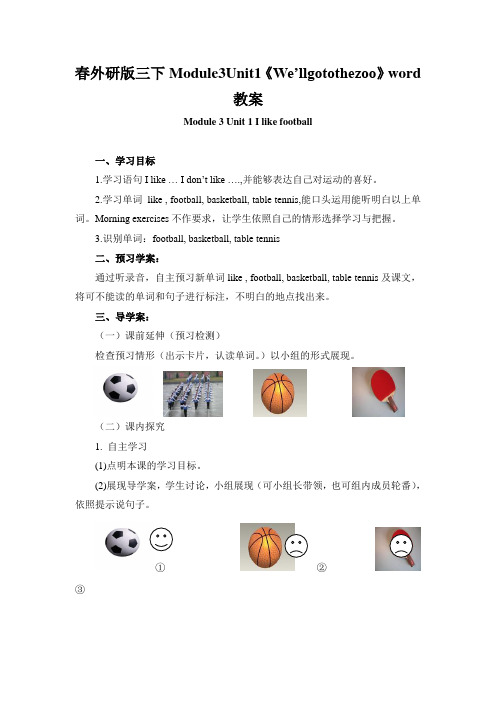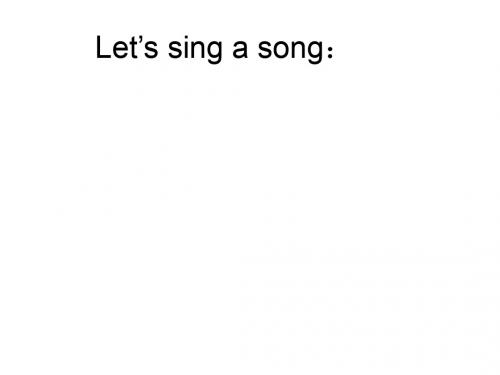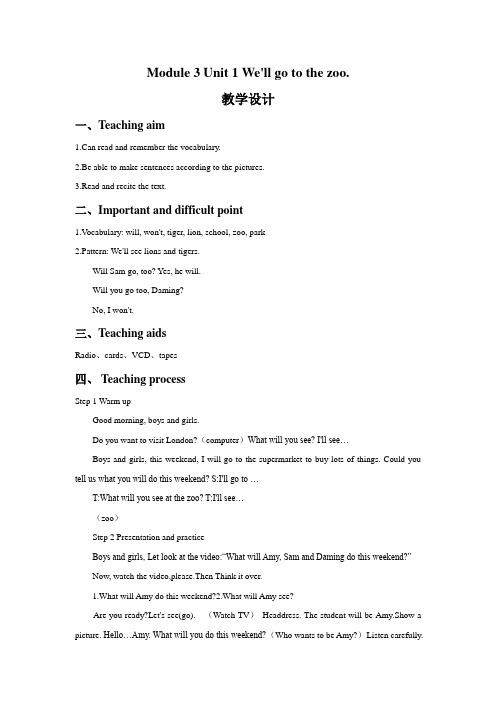外研社三年级下we'll go to the zoo
- 格式:pptx
- 大小:1.46 MB
- 文档页数:7

春外研版三下Module3Unit1《We’llgotothezoo》word教案Module 3 Unit 1 I like football一、学习目标1.学习语句I like … I don’t like ….,并能够表达自己对运动的喜好。
2.学习单词like , football, basketball, table tennis,能口头运用能听明白以上单词。
Morning exercises不作要求,让学生依照自己的情形选择学习与把握。
3.识别单词:football, basketball, table tennis二、预习学案:通过听录音,自主预习新单词like , football, basketball, table tennis及课文,将可不能读的单词和句子进行标注,不明白的地点找出来。
三、导学案:(一)课前延伸(预习检测)检查预习情形(出示卡片,认读单词。
)以小组的形式展现。
(二)课内探究1. 自主学习(1)点明本课的学习目标。
(2)展现导学案,学生讨论,小组展现(可小组长带领,也可组内成员轮番),依照提示说句子。
①②③④(3)个人学习学生在学习新单词后,自主学习新课文。
遇到不明白得地点可在小组内交流解决。
记录好重点、难点。
2. 合作探究(1)小组内解决刚才自己找到的不明白的地点。
(2)讨论如何用“like / don’t like”来谈论自己喜爱、不喜爱的物品。
并在小组内相互交流。
3.精讲点拨(1)单词morning exercises 的读音(2)do 的否定形式don’t 的书写及读音四、课堂检测:(一)认读单词(二)连词成句:1. like, I football (.)2.don’t, basketball, I, like(.)五、课后作业:1.听录音,朗读课文。
2.给家人或同学描述自己喜爱或不喜爱的事物,至少三样。
六、板书设计:Unit 1 I like football.football footballbasketball basketballI like table tennis I don’t like table tennismorning exercises morning exercises。


三年级下册英语教案-《Module 3 Unit 1 We’ll go to thezoo.》外研社(一起)一、教学目标1.学习掌握表示活动的动词短语:go to the zoo, go to the park, go to the cinema, go to the museum。
2.学习掌握表示交通工具的单词:bus, car, train。
3.能够进行简单的日常问答:Where will you go? I will go to thezoo/park/cinema/museum by bus/car/train。
4.能够听懂、会说、会读、会写本单元的重点语言和句型。
二、教学重难点1.教学重点:表示活动的动词短语的掌握;表示交通工具的单词的学习。
2.教学难点:用英语进行简单的日常问答,并能流利地表达自己的意见和计划。
三、教学准备1.音响设备、多媒体设备。
2.课件和PPT。
3.教师制作的锻炼练习。
四、教学步骤1. Warm-up(5分钟)1.教师打招呼和下达今天的任务,然后向学生询问本单元涉及的活动和交通方式。
2.让学生使用模版语句回答问题。
2. Presentation(20分钟)1.展示带有图片的PPT并引导学生认识并掌握关于活动和交通方式的单词和短语:go to the zoo/park/cinema/museum by bus/car/train。
2.通过图片和音频让学生听、说、读、写关于单词和短语的正确发音和拼写。
3. Practice(25分钟)1.分组训练。
2.让学生看着PPT进行练习,学习使用表示活动的短语和表示交通方式的单词进行简单的日常问答。
3.老师在训练过程中不断提醒、澄清和纠正学生的错误,帮助学生熟悉和掌握语言。
4. Production(10分钟)1.让学生根据所学知识编写自己的日程计划,并使用所学语言进行简单的句子表述。
2.抽几名学生讲述自己的日程计划。
5. Summary(5分钟)教师对本节课的内容进行总结和反思,并向学生回答遇到的问题。



Module 3 Unit 1 We'll go to the zoo.教学设计一、Teaching aim1.Can read and remember the vocabulary.2.Be able to make sentences according to the pictures.3.Read and recite the text.二、Important and difficult point1.V ocabulary: will, won't, tiger, lion, school, zoo, park2.Pattern: We'll see lions and tigers.Will Sam go, too? Yes, he will.Will you go too, Daming?No, I won't.三、Teaching aidsRadio、cards、VCD、tapes四、 Teaching processStep 1 Warm upGood morning, boys and girls.Do you want to visit London?(computer)What will you see? I'll see…Boys and girls, this weekend, I will go to the supermarket to buy lots of things. Could you tell us what you will do this weekend? S:I'll go to …T:What will you see at the zoo? T:I'll see…(zoo)Step 2 Presentation and practiceBoys and girls, Let look at the video:“What will Amy, Sam and Daming do this weekend?”Now, watch the video,please.Then Think it over.1.What will Amy do this weekend?2.What will Amy see?Are you ready?Let's see(go). (Watch TV)Headdress. The student will be Amy.Show a picture. Hello…Amy. What will you do this weekend?(Who wants to be Amy?)Listen carefully.S:I don't know. S: Maybe I'll(we'll)go to the zoo. Let's go on. What will you see? S: We'll see lions and tigers. (read the tiger)Look at the picture:(Listen)Who is he? Daming, how do you ask about Sam? S:Will ___go too?S: Yes,___will.Pay attention ,please.Amy and Sam are two children. what will you See? I'll or We'll?S: We'll see lions and tigers.Show the computer.T:Will Daming go too?(Listen carefully.)S:No, I won't.(Read it one by one.)Now, Daming won't go to the zoo. How does Amy ask? Please listen carefully. Who will be Amy?How do you ask? S:Will you go too,Daming?(Try to say.)S: No, I won't.T:What will you do Daming? s:I will visit my grandpa in the countryside.countrysideT: Will you see tigers/lions there? S:No.I won't tigers/lions.T: What will you see?S: I'll see ducks…lots of pigs.Boys and girls, please look at the blackboard. This weekend, Amy will go to the zoo. Sam will go too. Sam and Amy (They)will see lions and tigers. But Daming won't go to the zoo. He will go to the countryside. He will visit his grandpa. He won't see lions and tigers. But he will see lots of pigs.Now ,by this way please watch the video again.Now open your book and turn to page 10.Let's listen and say.O.k? Listen and say.Step 3 Consolidation and extension1. Listen to the tape recorder then say.Boys and girls,please open your book,and turn to page 10. Listen and say.2.let's do exercises to check up what you have learned.Now open the activity book .(Part 1)Have you finished?No.1 Who wants to tell us your answer?If you are all right, please raise your hands.3.Do you like games?Let's play a guessing game.4. Boys and girls,what will you do this weekend? Let's talk about it with your partner in your groups. Then come to the front and act out.Ok.5.Boys and girls, Pay attention. Ms. Smart's family will have a good weekend. Are youinteresting in this story? I'll give you some questions. Please find out the answer.Questions: What will they do? What will they see?五、Homework1. Listen to the tape recorder then remember these new sentences.2.Free talk with your parents.What will you do this weekend?。
Module 3 Unit 1 We'll go to the zoo1教学目标语言知识1.能听、说、认读单词maybe, tiger, lots of , countryside.2.能在真实情境中灵活运用句型What will you do this weekend? I will… Will you…? Yes, I will. No, I won’t. 交流周末活动计划。
3、学生能够阅读理解掌握课文内容,扩展运用所学知识谈论周末活动。
语言技能灵活运用What will you do this weekend? I will… Will you…? Yes, I will. No, I won’t. 谈论周末计划以及询问他人将做某事。
语言运用使学生通过自主学习课文,能综合运用所学知识,联系实际交流周末活动计划,从而培养学生自主学习和综合运用英语的能力。
2学情分析本节课的授课对象是三年级学生,他们已经学了两年多的英语,具备了一定的英语听、说、读、写能力,为学习新知奠定了基础。
三年级的孩子活泼好动,乐于表现、善于模仿,但他们仍然存在着稳定性较差,注意力不易长时间集中等特点。
所以教师应想方设法为他们创设真实、有趣的语言学习环境,通过采用多样化的教学手段将听、说、玩、演融于一体,激发他们学习英语的兴趣和愿望。
3重点难点1. 要求学生灵活运用句型What will you do this weekend? Maybe I’ll … Will you …? Yes, I will. No, I won’t. 谈论周末计划以及询问他人将做某事。
2. 要求学生通过自主学习阅读理解课文,能拓展运用所学知识谈论周末活动。
3.培养学生英语阅读理解和自主学习能力,要求学生能够联系生活,综合运用所学知识进行交流。
4教学过程Step1. Warming-up快乐导入①Greetings and sing a songT: Hello, children! How are you?【课件CAI播放歌曲the London eye】②Free talk 引出weekendT: Oh, you sing very well.Now who can me what day is today?How many days are there in a week? What are they?Saturday and Sunday are weekend.③T: Do you like weekend?T: Oh, me too, I can watch TV at the weekend, I can go to the park. what can you do at the weekend?④T: I’ve got some phrases. Can you read them?→T show the phrases of verb one by one, get the individual student to read them.Step 2: Presentations 新知学习①学习句型 T: Oh, so many activities.Today let’s talk about weekend plan ok?→(PPT) What will you do this weekend? What’s the meaning?[ 课件出示句子“What will you do this weekend?]→ Now let’s repeat, listen! (点击喇叭)→ 出示句子卡操练‘What will you do this weekend?’()→ 板书I will / I’ll … ( 师带读2句) How about you?→ Pair work: Now please do pair work with your desk mate. (适当中文解释)→ Report: (同座对话)学习Will you…?T: What will she do? Oh, she will …will you …? 问一学生答。
三年级下册英语教案-Module 3 Unit 1 We’ll go to thezoo|外研社(一起)教学目标1. 知识与技能:让学生掌握本课的生词和句型,如“zoo”,“we’ll go to”等,并能用英语描述他们将要去的地方。
2. 过程与方法:通过情境创设,让学生在实际语境中运用英语,提高他们的英语口语表达能力。
3. 情感态度价值观:培养学生对大自然的热爱,激发他们探索动物世界的兴趣。
教学内容1. 词汇:学生需要掌握的词汇包括“zoo”,“elephant”,“tiger”,“lion”等。
2. 句型:主要句型为“We’ll go to the zoo.”和“Whatwill you see?”等。
3. 功能:学生能够用英语询问和描述他们将要去的地方和将要看到的动物。
教学重点与难点1. 重点:学生需要掌握的词汇和句型,能够用英语描述他们将要去的地方和将要看到的动物。
2. 难点:正确使用将来时态,以及正确发音生词。
教具与学具准备1. 教具:多媒体设备,动物图片,单词卡片。
2. 学具:学生需要准备笔记本和文具。
教学过程1. 导入:通过展示一些动物的图片,引起学生的兴趣,然后引出本课的主题“We’ll go to the zoo.”。
2. 新授:通过多媒体展示和讲解,让学生学习本课的生词和句型。
3. 练习:通过各种活动,如角色扮演,让学生在实际语境中练习英语。
4. 巩固:通过游戏和竞赛,巩固学生对生词和句型的掌握。
板书设计在黑板上列出本课的生词和句型,用彩色粉笔突出重点。
可以画一些简单的动物图像,帮助学生记忆生词。
作业设计1. 书面作业:让学生写一段关于他们将要去的地方和将要看到的动物的英语短文。
2. 口头作业:让学生和家人或朋友用英语分享他们将要去的地方和将要看到的动物。
课后反思1. 教学效果:通过课后作业和课堂表现,评估学生对本课内容的掌握程度。
2. 改进措施:根据学生的反馈和学习情况,调整教学方法和策略,以提高教学效果。